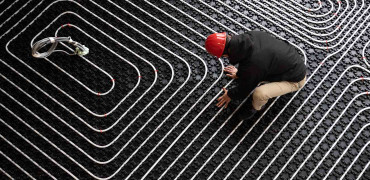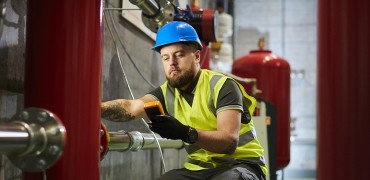The latest official figures for the Boiler Upgrade Scheme, the government’s flagship programme to incentivise heat pump installations, suggest that demand from consumers continues to rise, with applications up 81% over the same time last year.
Yet, despite such encouragement for UK heat pump manufacturers and suppliers, there’s no getting the away from the fact that the UK market is much smaller compared to our European neighbours and continues to under-perform for those who hope to see it start to match the level of demand for gas boilers over the coming years.
The report shows that when electricity is more affordable, heat pumps sell more.
Green levies
While it seems that consumers are attracted to the idea of having a more environmentally-friendly and sustainable heating system installed, the upfront cost of the installation remains a significant barrier and, as it stands, installation companies are unable to present a compelling case when it comes to running costs.
Despite the undisputed efficiency of heat pump systems in comparison to gas boilers, the relative cost of electricity to gas means that most users will be disappointed if they believed that they are set to benefit from any significant reduction in their energy bill.
The relative cost of electricity compared to natural gas, which is currently around four times more expensive, means that anyone relying on an electricity driven system can expect to be paying more for the privilege of using cleaner energy.
One of the main reasons for the ongoing disparity are the green levies that are disproportionally applied to electricity bills in order to fund initiatives that reduce carbon emissions and support renewable energy.
The thinking is that electricity generation has a higher potential for decarbonisation through technologies such as wind, solar, and hydro power and the imposition of such levies will help to reduce the country’s reliance on fossil fuels.
Many of the energy efficiency programmes funded by green levies also focus on reducing electricity consumption, leading to lower overall energy demand and emissions.
However, many critics have argued that there needs to be a fairer, more balanced approach that also addresses the carbon impact of gas and ensure that all sectors contribute equally to the transition to more sustainable energy.
And if the UK government is serious about its ambitions for the growth of the heat pump market, it makes perfect sense to consider any measures that will result in a reduction in running costs.
Cheaper electricity = more heat pumps
Such arguments have been strengthened by a recent report from the European Heat Pump Association that highlights the impact of a low electricity and gas price ratio in accelerating heat pump deployment.
In summary, it shows that when electricity is more affordable, heat pumps sell more.
As said, the ratio is close to 4 in the UK, which is the highest in Europe and nearly double the EHPA’s recommendation of 2.
It means that UK domestic electricity consumers bear around 85% of the green levies, so that a typical heat pump consumer will pay an estimated £170 more than an equivalent gas boiler consumer in levy costs per annum.
Perhaps not too surprisingly, the report also points to the fact that those countries with a high ‘spark gap’ – the ratio between household electricity and gas prices – have a lower annual sales of heat pumps per population.
More equity needed in the market
So, with electric heating and heat pump users bearing the bulk of the financial burden, why shouldn’t there be a more equitable distribution of costs?
Rebalancing the relatively high price of electricity seems like a clear way to encourage the take up of heat pumps at a time when sales remain well below the target levels required for the country to reach its goal of 600,000 systems being fitted annually by 2028.
The government clearly accepts the need to remove the barrier of installation costs for consumers, so logic suggests that it should also acknowledge that more needs to be done to ensure that a low carbon heating solution will also deliver lower heating costs.
However, while the removal of levies would obviously be welcome news for heat pump users, they still represent a much smaller percentage of consumers compared to gas users and it would be a brave administration that would consider placing more of the burden on to gas heating when the number of households in fuel poverty continues to be at critical levels.
The transfer of levies would effectively raise fuel bills for millions of people, most of which wouldn’t have the available finances to make investment in a heat pump a viable option, even with the grants available from the Boiler Upgrade Scheme.
Step by step
Given that most UK households are unlikely to enjoy a boost to their incomes anytime soon, perhaps the solution lies in taking smaller steps to close the spark gap and finding other ways to reduce running costs for heat pump users without unduly punishing gas consumers.
Some energy providers are already working to offer reduced energy tariffs for heat pump households while others have argued that communities might be encouraged to switch to cleaner energy sources and appliances by discounted bills being awarded to those that live near wind turbines.
With the new Labour government’s pledge to revitalise the green economy, any proposal that can help to drive the transition to cleaner energy and also demonstrate a fairer and more transparent approach to funding that transition, deserves to be taken seriously.
Chris Jones is editor of PHAM News




